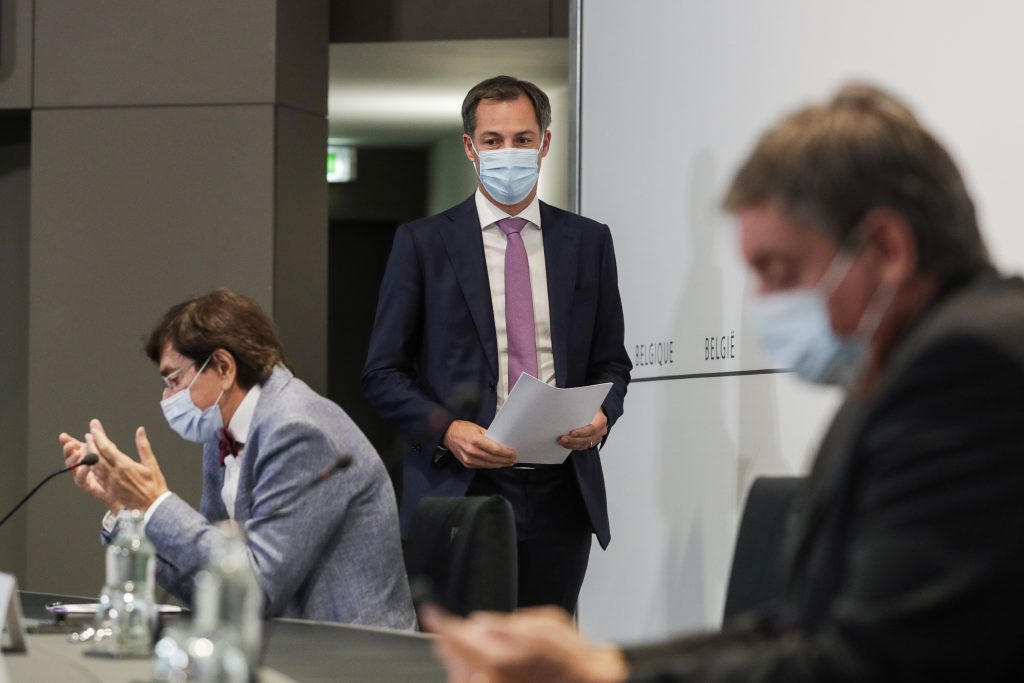By applying broad measures across different sectors at the Consultative Committee on Wednesday, Belgian Prime Minister Alexander De Croo wants to keep businesses, the hospitality sector and schools open in the face of the rising infection figures.
The Committee will meet tomorrow at 2:30 PM to discuss how to stop the spread of the virus but it is as good as certain that Belgium should not expect any closures or partial lockdowns, confirmed De Croo.
"From the moment that more than 500 intensive care beds are occupied, we are crossing a red line," he told VRT. "We can handle that if we take broad measures everywhere."
While the Prime Minister understood people's disappointment about the situation, he said that more compulsory teleworking is one of the most effective measures to limit the number of contacts people have every day.
"The last thing we need to do is point fingers from one sector to another. We can control this," he said. "The only way we can do that is to take measures that are broad and span different sectors."
Related News
- Four days of telework but open nightclubs: Federal Government proposes new measures
- Belgium recommended strict new measures in leaked document: What are they?
- Mandatory vaccination for health care workers from 1 April
While the GEMS expert group recommended full-time teleworking until the Christmas holidays, a proposal by the Federal Government speaks of a four-day obligation to work from home; a measure opposed by employers who want staff in the workplace more often.
In the meantime, Federal Economy and Labour Minister Pierre-Yves Dermagne said that he hopes an interim solution can reconcile employers and experts.
"We know that full-time teleworking is difficult for some people and companies," he said on Walloon radio. "That is why we are going to propose a hybrid formula: three to four days of compulsory teleworking, with the possibility of coming to the company anyway."
Rules, not recommendations
Dermagne made clear the need for mandatory regulations rather than just recommendations. "We have noticed that when it is simply recommended, it is not sufficiently respected. I regret that we have to go to an obligation again but we think it is necessary, given the evolution of the figures."
By ensuring that the circulation is reduced and limiting contact between people, Belgium will be able to keep businesses, the hospitality sector and schools open. Face masks will also help with that, possibly in combination with the Covid Safe Ticket (CST), Dermagne said.
"Looking at the situation today, you see that more and more people are in our hospitals. Thanks to the vaccination, it is something that we have under control but I want to make sure that we can keep it under control throughout the winter," De Croo said.
That will only be possible by taking a number of measures that allow life can go on, but with an additional precautions.
'Une fausse bonne idée'
Although the Federal Government agreed on making vaccination mandatory in the healthcare sector, De Croo made it clear that he is not in favour of such an obligation for the general population.
"In French this is called 'une fausse bonne idée' (a false good idea)," he explained, referring to something that at first glance seems like a good idea but does not work as well as expected.
"While it sounds easy, it is not at all in practice and I think that it will have other effects," De Croo said, adding that people who could still be persuaded might be more likely to reject the idea. For him, the best way to vaccinate as many people as possible is by convincing them with the right arguments, and by explaining the facts.
"Those who are vaccinated have less chance of becoming infected, of falling ill or ending up in hospital. It is not perfect protection but it is still the best we have," De Croo said. "I still think that it is better to convince people than to force them."
De Croo pointed out that no other European country is making vaccination mandatory. "There are hardly any countries in the world where there is an obligation to vaccinate."
In the meantime, the campaign to give people their third/booster shot is "in full swing," De Croo said. "Today, we have already given a third dose to hundreds of thousands of people, mainly those over 65."
"Now, it is one of the big priorities to ensure that there is a new vaccination wave, with a third jab for everyone."

